Brendon Gale reckons that during his first six years of life on the family dairy farm at Elliott in Tasmania’s fertile North-West he never once took off his footy boots.
Although his eventual passion for Aussie Rules was not yet fully moulded – coming later following subsequent moves to Penguin, and then Burnie – the young tacker just loved to ramble.
And the wide, open spaces of the fifth-generation Gale property run by father Don offered the perfect playground for Brendon and his many siblings.
“I remember being on the back of tractors and probably getting in the way more than helping, but there was just this real sense of freedom,” Gale says.
“I was only there for six years, but whenever I’ve gone back to visit Elliott – typically over the summer holidays – there are the familiar smells of hay-baling, diesel engines, cow sheds, and irrigation over spuds. And it’s almost the greatest sense of home I think I have.”
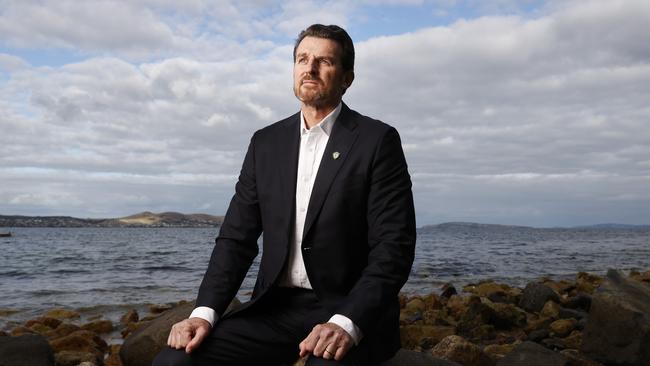
Home is a theme that runs deeply through Gale’s 56-year life story, alongside firm belief in the concepts of teamwork, humility and destiny.
Home is what drew the 244-game Richmond Football Club champion back to Tigerland as a chief executive whose success in restoring the club’s finances triggered a triple-premiership dynasty.
And home is what has brought the former Penguin Football Club mini-leaguer and Burnie Hawks playing prodigy back to his home state to accept the football challenge of a lifetime building Tasmania’s long-awaited AFL club from the ground up.
PENGUIN FOOTBALL CLUB
When Don Gale suddenly upped stumps from the farm to start an agricultural supplies business in the nearby coastal town of Penguin, in the mid-70s, young Brendon was introduced to a “magical” new world of beaches, sport, and community.
And the beating heart of the tight-knit hamlet was the Penguin Football Club, which at the time was waging a successful David and Goliath battle against the rest of the North-West football world.
“Our first football heroes were our local heroes,” Gale recalls.
“It was never Collingwood or Carlton, or Richmond – it was the Penguin Football Club.
“Living in Penguin taught me the importance of community – and communities are basically teams, aren’t they?
“And I have really grown to believe in the power of teams to achieve great things.
“Whether you are a player, coach, volunteer, or selling Footy Records, everyone commits to the team and plays their role, and nobody gets too far ahead of themselves.”
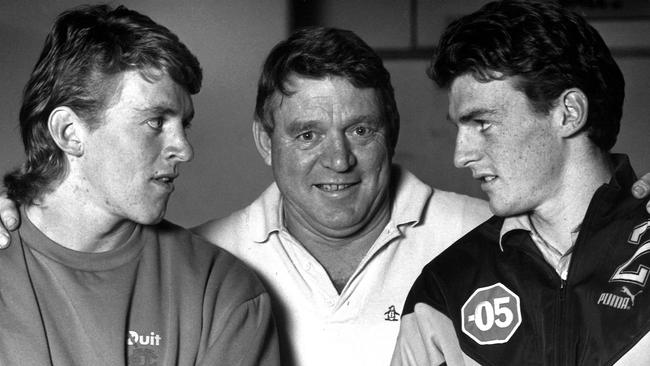
Despite Gale’s father being the NWFU’s first All-Australian representative and older brother Michael blazing a family trail at the Fitzroy Football Club, the 17-year-old’s first move after matriculating from Marist College was not to Melbourne but studying law at the University of Tasmania in Hobart.
After being lured back to Burnie at the end of his first academic year to play in a Hawks side led by legendary coach Warren McCarthy and Hawthorn premiership winner Colin Robertson, Gale was then picked up by the Tigers in the 1987 draft.
PUNT ROAD
Life in the big league came as a shock to the Tasmanian import, and it wasn’t just Melbourne’s traffic or cosmopolitan cafe culture that had his head spinning.

The physical requirements of being a listed VFL player were not anything Gale had been expecting when he packed his kitbag in Burnie, and he recalls the workload as being “just incredible”.
“I remember still being a young kid and getting home to eat dinner at 10pm, because you would start at 5 o’clock and do your running, skills, and your weights all in one night,” Gale says.
“I found it really, really challenging, and in fact, my body broke down.
“They say that it used to be easy to get drafted but hard to get a game, while nowadays it’s hard to get drafted but clubs will do everything possible to get you in the side and have a look at you early.
“So, I must admit for a while there I did have some self-doubt.”
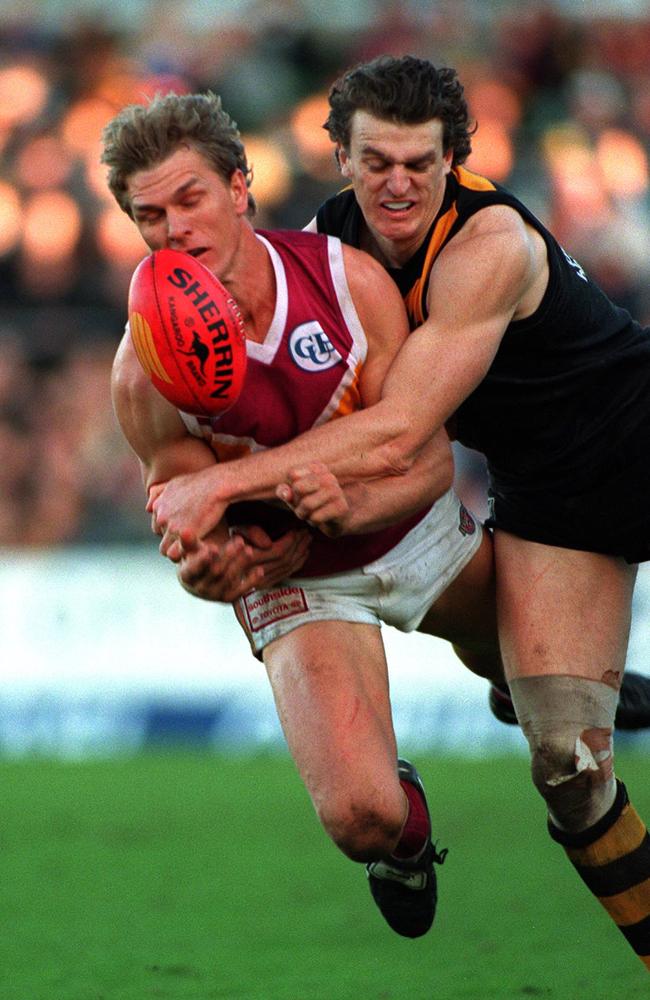
After overcoming a series of injury setbacks to establish himself as a goal-kicking weapon for the Richmond reserves in 1989, Gale was rewarded with a senior debut in the opening round of the 1990 season against the Brisbane Bears.
1990 STATE OF ORIGIN
Few games in Tasmanian football folklore have ever been discussed as much as the 1990 State of Origin clash with Victoria, at North Hobart Oval.
The Robert Shaw-coached home side’s famous victory, which took place more than three decades before the Devils licence was secured, was considered a catalyst for discussion about Tasmania’s rightful place in the AFL.
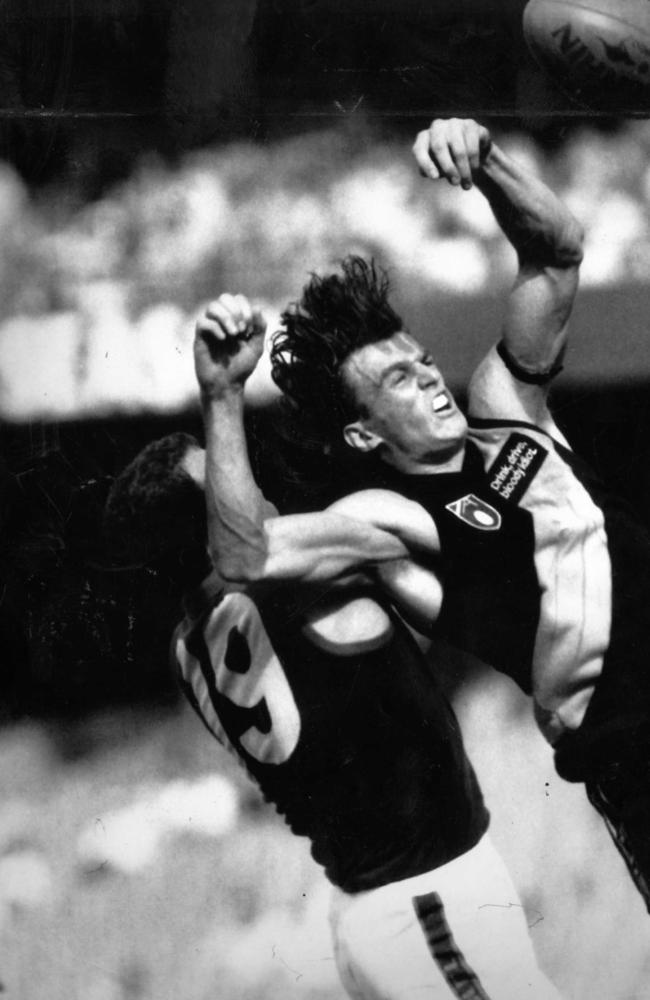
Gale, who was picked at centre half-forward for his Origin debut, recalls the game being special for personal reasons, but said the sense of history was not immediately apparent to players wearing the Map guernsey.
“I played that game with my brother, and the last time Tasmania beat Victoria, in 1960, our father had played,” Gale says.
“At half-time in our match, our father was among the players from the 1960 team who were paraded around the ground.
“When I look back now, it was a pretty special day for me.
“Apparently there were discussions going on about a potential licence at the time, which felt a bit above our pay grade.
“But I remember Rob asking after the game which of us would come back and play for Tassie if the opportunity was there, and there was a unanimous show of hands.
“We had a great night that night.”
POST-CAREER
After witnessing countless AFL players become lost and rudderless after leaving the game, Gale had a ready-made plan for his football retirement, beginning work at a leading Melbourne law firm almost immediately after his final game – a preliminary final loss to eventual premier Brisbane in 2001.
But, after being caught up in the colour and movement of a major final, the now ex-player found himself in the tiny office of a high-rise office building, leading a new life broken into six-minute billing units.
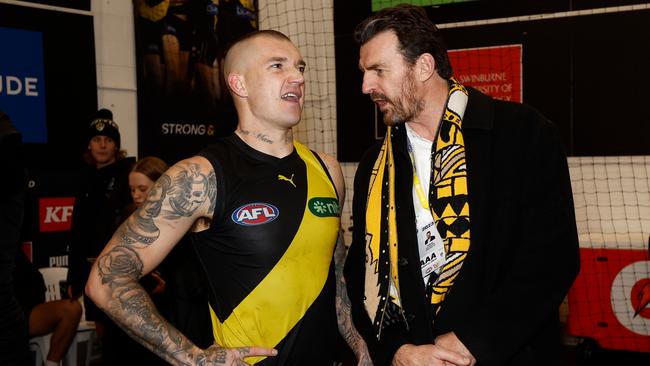
“There were some incredibly smart people there, and I worked on some really interesting deals and transactions,” Gale recalls.
“But I was there long enough to realise it wasn’t a life for me. There was a clear career progression, involving partnerships and good pay, but ultimately it didn’t nourish me.”
Gale’s next move was crucial to his own future trajectory, and the fortunes of the two football communities closest to his heart.
As chief executive of the AFL Players Association from 2005 to 2009, Gale helped negotiate a monster payment deal on behalf of his members and oversaw the introduction of a pioneering voluntary illicit drug policy.
But it was through his regular interactions with club bosses that Gale gained a first-class education in why some teams were successful and others were not, with the insights ultimately proving invaluable on his subsequent return to Tigerland.
“You’re dealing with clubs about different issues and grievances, and in different circumstances,” Gale recalls.
“And you notice that some clubs are almost metronomic in the way they are administered, while others are a bit behind the eight-ball and are more reactive.
“So, I guess some key themes began to ferment, then as the game grew, the skills and the experiences required to administer the game became increasingly sophisticated.
“At the end of 2009, Richmond president Gary March came to me and asked if I would be willing to put my hat in the ring for the upcoming chief executive vacancy.
“I was passionate about the club, and also saw the chance to test some things I believed in about terms of leadership and management, so I jumped.
“That was at the end of the 2009 season, less than 10 years after I retired.
“I’ve always believed in destiny, and I just believed Richmond were destined to be a great club again.
“I believed if we could get the back office running properly, we could set ourselves the goal [of premierships].
Gale’s 15-years running Richmond is now a matter of football history, with the club breaking a 37-year flag drought in 2017, before adding another two premierships in 2019 and 2020.
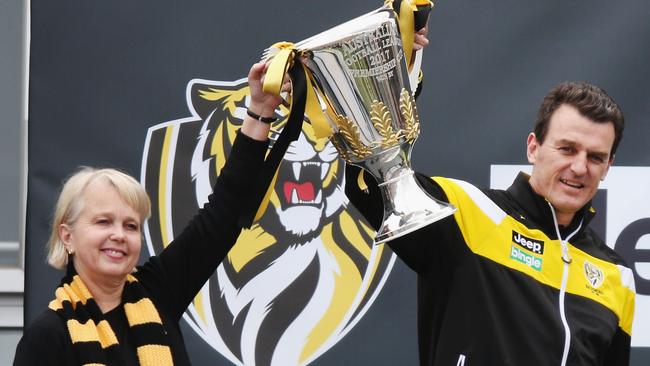
After being sounded out for the Tasmania Football Club chief executive role by club chairman Grant O’Brien soon after the 19th AFL licence was announced in 2023, Gale took stock of his work and family situation over the summer holidays back in Tasmania.
“I had about three weeks in Tasmania over Christmas in 2023, which was the longest break I had had in a while, and realised I was cooked,” he said.
“But with some clear air to reflect, I just felt that with 2024 being my 15th year at Richmond, it was probably time for a change.
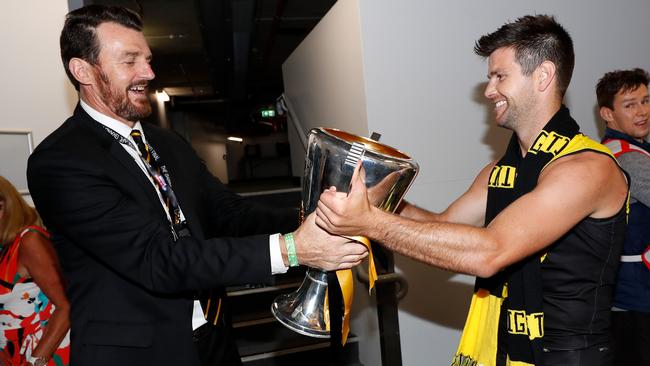
“And the growing excitement about the Tassie team probably influenced my thinking.
“Socially, economically, and politically – I have always thought about Tassie a lot.
“So, intellectually, I became increasingly drawn to building this football club.
“Having a blank canvas seemed really challenging, but bloody exciting.”
In May 2024, Gale publicly announced the season would be his last with the Tigers.
DEVILS
After a brief summer break, Gale touched down in Tasmania in February to an official Devils welcome in his home town of Penguin, before hitting the road to gauge sentiment from football communities across the island.
Back behind his desk in Hobart, Tasmania FC’s inaugural chief executive has plenty to exercise his mind, as he considers matters as diverse as player attraction and retention in Australia’s smallest state; the values the new club will operate by; and of course the Devils’ new home stadium.
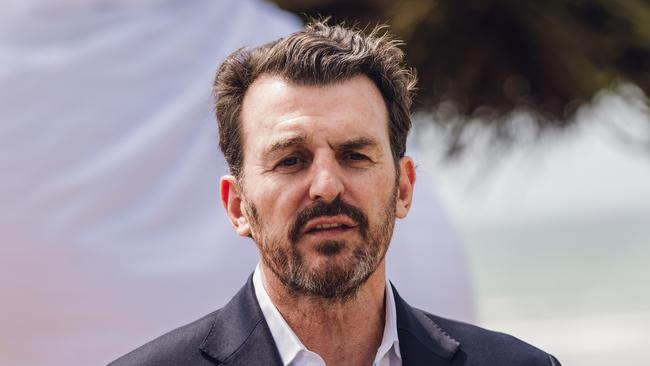
Gale explained why the club recently contacted its 200,000-strong member base to champion the cause of an infrastructure project that has attracted significant community and political resistance.
“The AFL didn’t give us a licence because they felt we deserved it, but because they thought Tasmania can pay its way. And the stadium goes to the heart of that,” Gale says.
“Stadiums are the single-most critical determinant of a club’s financial strength, and financial strength has a huge bearing in your competitiveness on the field.
“But we also understand there’s never a good time to build a stadium. They’re big, they’re expensive, and there’s always a range of other priorities.
“And the opposition to it here is not unique – if you speak to (former South Australian premier) John Olson about the Adelaide Oval upgrades, it was probably more hostile there.
“It’s only right and proper that people have their say, but it needs to be based on evidence and facts.
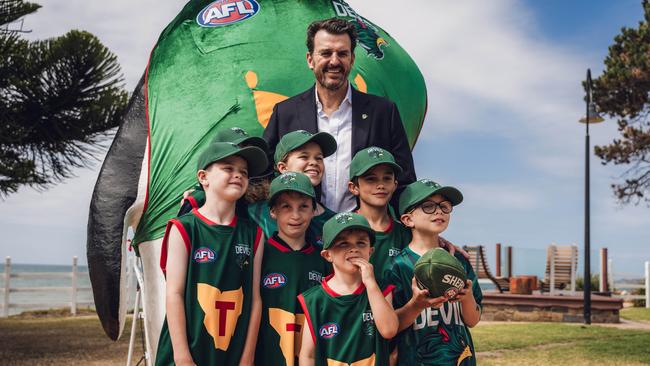
“But we are committed to whatever process the government puts in place, and ultimately, the project will go before parliament, and every parliamentarian will have their say.
“We try to keep out of the politics because our job is to build a club, but clearly our existence is contingent upon the stadium.”
PLAYER ATTRACTION
Almost as soon as AFL club presidents voted unanimously to grant Tasmania the league’s 19th licence in May 2023, doubts began emerging about the island state’s ability to attract and retain young athletes from around Australia.
What began as whispers became mainstream news when Hawthorn skipper James Sicily told a radio interview: “I couldn’t imagine myself living there. It would be hard.”
While such questions cannot be fully answered until the Devils hit the park, Gale says he had no concerns about the state’s ability to draw and keep the best talent.
“It’s the same for every team, because there’s pros and cons about living in any community,” he says. “But the first thing I’ll say is that people make places.
“It’s about the environment where you create a culture that is welcoming and supportive.
“I think there’s some incredibly compelling lifestyle attributes about Tassie, especially compared to Melbourne where you spend half your life in the car.

“There’s access to the natural environment – and Hobart, where the teams will be based – has some of the best cosmopolitan attractions of any capital city.
“And I think this sort of environment will allow Devils players to focus on being elite athletes, and live a good, balanced life. This is an incredible place, and I think we can sell a compelling story about it.”
DEVILS DNA
While Gale is under no illusions about the enormous challenges that lie in the months and years ahead, he knows that laying a strong cultural foundation at Tasmania FC will pay dividends in the long term.
The chief executive says he wanted the Devils to possess the attributes of the clubs he grew up in – competitive yet humble, and comprised of good people with down-to-earth, Tasmanian values.
“We’re a club that represents an entire state – no other club can claim that,” he says.
“But we’re going to be true to it, and that means we have to engage the whole state, and have visible involvement everywhere.
“It’s just really hard at the moment – and when there are so many balls in the air, and so few staff on the ground as we build out – at times it can feel a little overwhelming.
“Every night when I put my head on the pillow, I think ‘where do I need to focus my energy and attention tomorrow?’
“So every now and then, I just visualise our first game at the new stadium, that is just full to the rafters, with all the energy, excitement, and pride Tasmania has.
“Sometimes you can get caught up in the business of footy, so you really need to remind yourself why you are here.”
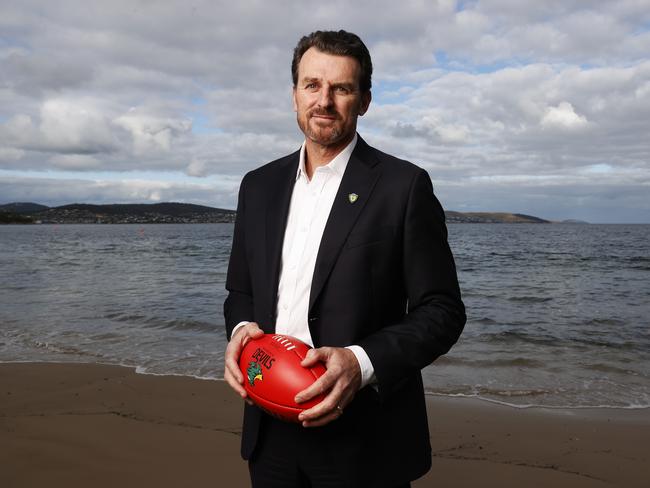
While Gale is building Tasmania’s first AFL club with on-field success in mind, he knows the Devils organisation has the potential to offer so much more for the state’s future generations.
The experienced administrator says he has witnessed first-hand the transformative power of football clubs in communities, and was optimistic the Devils could eventually help Tasmania overcome its economic and growth challenges.
“Leaving the state is a well-worn path, and there will always be that option,” he says.
“But there’ll be so many more reasons for people to stay and work in and around this sports, business, entertainment, cultural ecosystem.”
“A life in sport is a commitment to self-improvement every day.
“So, I think when you have a bunch of highly visible athletes, male and female, committing to this life, I think it will inspire our youth across the whole state. Not just in terms of igniting football or sporting pathways, but showing that it’s cool to commit to self-improvement, or to be the best student I can be.
“So it’s going to deliver education outcomes, it’s going to deliver health outcomes. We’re going to be more confident, and we’re going to walk taller.”

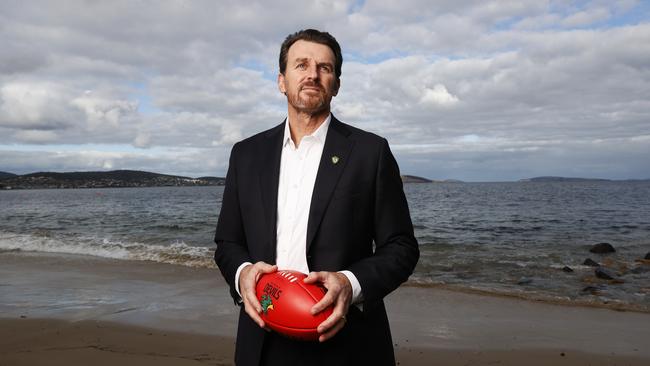
Add your comment to this story
To join the conversation, please log in. Don't have an account? Register
Join the conversation, you are commenting as Logout
Meet the talented Tasmanians keeping traditional arts alive
In a world often dominated by consumerism and mass-production, these four talented Tasmanians are finding creative success in traditional arts while also showcasing Tasmania to the world
This Hobart Italian restaurant is one to add to your must-eat list
With excellent service and well-priced dishes that celebrate both Italy and Tasmania, this standout eatery – tucked inside one of the city’s hotels – comes highly recommended, writes Alix Davis